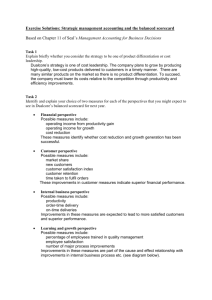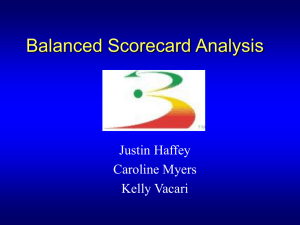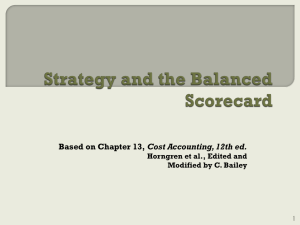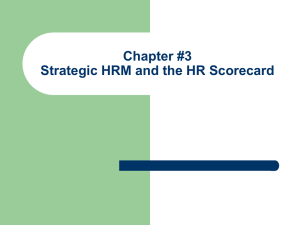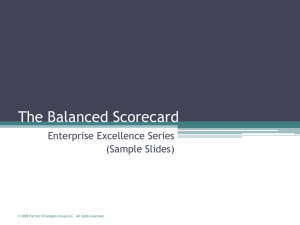emba accounting quick-start seminar
advertisement
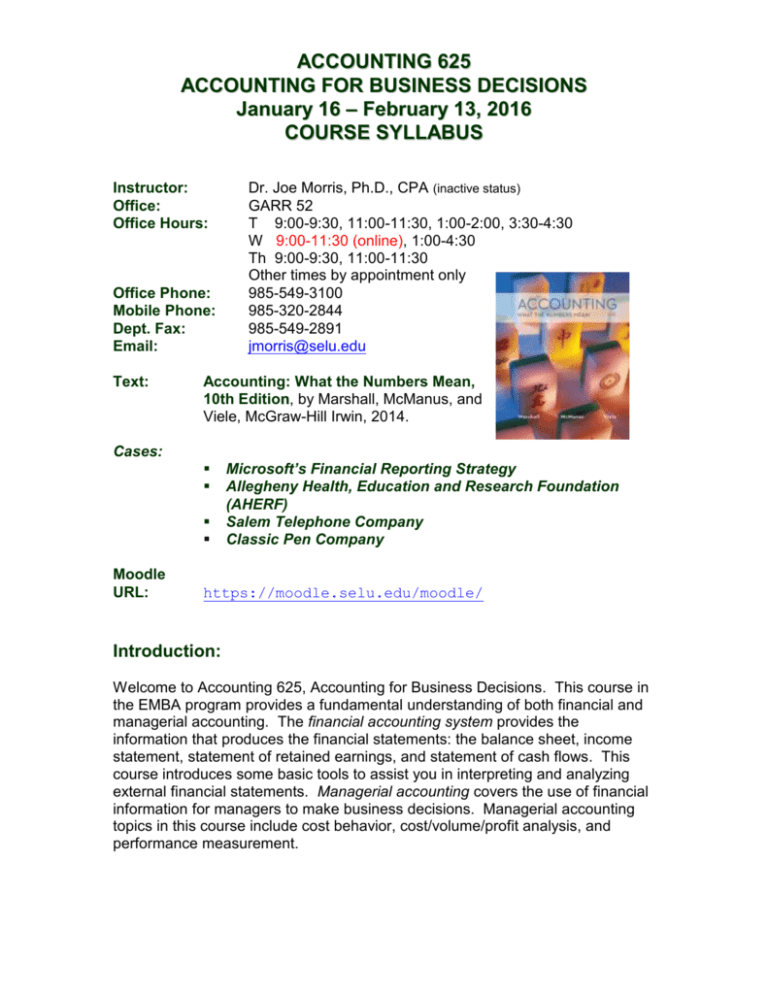
ACCOUNTING 625 ACCOUNTING FOR BUSINESS DECISIONS January 16 – February 13, 2016 COURSE SYLLABUS Instructor: Office: Office Hours: Office Phone: Mobile Phone: Dept. Fax: Email: Text: Dr. Joe Morris, Ph.D., CPA (inactive status) GARR 52 T 9:00-9:30, 11:00-11:30, 1:00-2:00, 3:30-4:30 W 9:00-11:30 (online), 1:00-4:30 Th 9:00-9:30, 11:00-11:30 Other times by appointment only 985-549-3100 985-320-2844 985-549-2891 jmorris@selu.edu Accounting: What the Numbers Mean, 10th Edition n, by Marshall, McManus, and Viele, McGraw-Hill Irwin, 2014. Cases: Moodle URL: Microsoft’s Financial Reporting Strategy Allegheny Health, Education and Research Foundation (AHERF) Salem Telephone Company Classic Pen Company https://moodle.selu.edu/moodle/ Introduction: Welcome to Accounting 625, Accounting for Business Decisions. This course in the EMBA program provides a fundamental understanding of both financial and managerial accounting. The financial accounting system provides the information that produces the financial statements: the balance sheet, income statement, statement of retained earnings, and statement of cash flows. This course introduces some basic tools to assist you in interpreting and analyzing external financial statements. Managerial accounting covers the use of financial information for managers to make business decisions. Managerial accounting topics in this course include cost behavior, cost/volume/profit analysis, and performance measurement. Accounting 625 Course Syllabus Page 2 Course objectives: The overall objective of this course is to help students develop an understanding of how accounting and other financial data are used in business decisions. After completing the course, students should be able to demonstrate competence in the base of knowledge and skills necessary to compete successfully in today’s marketplace. More specifically, students should be able to: Understand and analyze a set of financial statements. Understand critical accounting principles and concepts including revenue recognition and matching. Understand how corporate governance relates to ethical issues and the quality of financial reporting. Apply cost/volume/profit analysis and activity-based costing to assist in making decisions. Understand different methods of performance measurement including the balanced scorecard. Think critically and actively participate in case discussions. Develop oral and written communication skills. Course Overview: 1. The resources in this course include: A textbook Required (and optional) readings Lectures, PowerPoint notes, and handouts Cases Practice problems Selected library resources and internet sites 2. Assignments include: Financial statement analysis assignment This graded assignment requires constructing financial statements and performing ratio analysis in an Excel format. Case analyses Some of the cases will be covered in class and are ungraded. Students should read each case prior to class, have a general familiarity with the facts of the case, and study the case discussion questions. One graded case will be completed outside of class (online Class 2). Three of the cases are copyrighted by Harvard Business Publishing and cannot be posted online. These cases have already been distributed to you. The fourth case is copyrighted by the AICPA and is on the Moodle web site (Class 2 section). Quiz covering financial and managerial accounting topics Accounting 625 Course Syllabus 3. Page 3 Balance scorecard assignment This graded assignment requires demonstrating and understanding of the balanced scorecard and constructing a scorecard for your company Final examination The final exam will be comprised of multiple-choice questions and essay questions. A study checklist will be provided for the final exam. The course is divided into five class meetings with the following topics: Class 1 (on campus)—January 16: Financial statements, earnings quality, and financial statement analysis Class 2 (online)—January 23: Corporate governance Class 3 (on campus)—January 30: Cost behavior, breakeven analysis, and activity-based costing Class 4 (online)—February 6: Performance measurement and the balanced scorecard Class 5 (on campus)—February 13: Balanced scorecard, review, and Final Exam A detailed agenda for each class meeting appears later in this syllabus and in the “Class” sections of the Moodle web site. Class meetings 1, 3, and 5 are held on campus. Class meetings 2 and 4 are conducted online. Evaluation: Assignments have the following weights: Assignment Financial statement analysis assignment Case analysis Financial and managerial accounting quiz* Balanced scorecard assignment Final exam* Totals Points 55 100 45 100 100 400 Weight 13.75% 25.00% 11.25% 25.00% 25.00% 100.00% Semester grades are determined using a 10-percentage-point grading scale (90% - 100% = A, 80% - 89% = B, etc.). *Note: Bring a calculator. Cell phone calculators are not permitted. Accounting 625 Course Syllabus Page 4 Class Meeting Schedule and Agendas: Note: Before the first class meeting, please complete the Quick-Start textbook reading assignments, PowerPoint reading assignments, and the five Quick-Start quizzes. If time becomes an issue, you may defer completing Quick-Start Module 5 on Managerial Accounting until the week preceding Class Period 3. Class Period 1 Jan 16 Checklist of Items to Complete Before Class Read required articles (see below) Class Schedule (approx.) 8:00-8:45 Agenda Items During Class Introduction to the course 8:45-9:30 Review of financial reporting 9:30-9:45 Break 9:45-10:15 Review of revenue recognition, matching, earnings quality, earnings management, and fraud Read case assigned and study case questions Review Checklist on Earnings Management and Fraud (just scan this for an appreciation of what’s involved; this will not be tested) Other Resources (if needed): Text Chapters 2, 3, 5, 9, 10, 11 (especially 3 and 11) 10:15-11:30 Case: Microsoft’s Financial Reporting Strategy, discussion questions 11:30-12:30 Lunch 12:30-2:00 Review of basic financial statement analysis 2:00-3:00 Financial statement analysis practice problem 3:00-3:15 Break 3:15-5:00 Introduction to corporate governance Required Readings for Class 1 “Tread Lightly Through These Accounting Minefields,” H. David Sherman and S. David (Located in the Articles folder in Young, in Harvard Business Review, June 2001, Volume 79, Issue 7. Class 1 section of Moodle) “Expert Shows Credit Execs How to Dissect Financial Statements,” Managing Credit, Receivables & Collections, Vol. 4, Issue 9, September 2004. Accounting 625 Course Syllabus Class Period 2 Jan 23 Class Schedule (approx.) Page 5 Agenda Items Financial Statement Analysis Assignment Due via email by midnight, Monday, January 25 Review PowerPoint lecture on corporate governance, audit committees, and boards of directors Read required articles (see below) Read Sarbanes Oxley Act of 2002, SEC. 301, 302, and 404. Read and analyze Case: Allegheny Health, Education and Research Foundation (AHERF) (submit answers to questions via email by midnight, Wednesday, January 27) Online Other Resources (if needed): Text Chapter 10 Required Readings for Class 2 (Located in the Articles folder in the Class 2 section of Moodle) Deloitte Center for Corporate Governance: http://www.corpgov.deloitte.com/si te/us/ “Principles of Corporate Governance,” by The Business Roundtable, May 2002. “The Enron story: you can fool some of the people some of the time ... “Alyson Tonge, Lesley Greer, and Alan Lawton, Business Ethics: A European Review, Vol. 12, Issue 1, January 2003. Accounting 625 Course Syllabus Class Period 3 Jan 30 Page 6 Checklist of Items to Complete Before Class Read required articles (see below) Class Schedule (approx.) 8:00-9:00 Follow-up discussion on Financial Statement Analysis Assignment and AHERF case 9:00-9:30 Review of cost behavior and breakeven analysis 9:30-9:45 Break 9:45-10:15 Breakeven analysis practice problems 10:15-11:15 Introduction to case: Salem Telephone Company; answer questions in break-out groups 11:15-12:00 Wrap-up discussion of Salem case 12:00-1:00 Lunch Read cases assigned and study case questions Other Resources: Text Chapters 12 & 13 (if needed) Required Readings for Class 3 (Located in Articles folder in the Class 3 section of Moodle) Agenda Items During Class 1:00-1:45 Review of activity-based costing (ABC) and practice problems 1:45-2:30 Introduction to case: Classic Pen Company, followed by discussion questions in break-out groups 2:30-3:00 Wrap-up discussion of Classic Pen case 3:00-3:15 Break 3:15-4:00 Quiz on financial statement analysis, breakeven analysis, and ABC 4:00-5:00 Introduction to performance measurement: ROI, ROE, residual income, and balanced scorecard “Gain Control of Your Organization's Finances: Break-Even Analysis,” Joseph R. Razek, Nonprofit World, Vol. 7, Issue 5, Sep/Oct 1989. “How ABC Analysis Will Save PPMC Over $1 Million a Year,” Financial Analysis, Planning & Reporting, Vol. 3, Issue 11, November 2003. Accounting 625 Course Syllabus Class Period 4 Class Schedule (approx.) Agenda Items Review PowerPoint lecture on performance measurements: ROI, residual income, and balanced scorecard Read required articles (see below) Complete the Balanced Scorecard Assignment (analysis to be submitted via email by midnight, Wednesday, February 10) Online Feb 6 Page 7 Resources: Text Chapter 15, Pages 608-615 (if needed) Required Readings for “The Balanced Scorecard--Measures That Drive Performance,” Robert S. Kaplan and David P. Norton, Class 4 Harvard Business Review, Vol. 70, Issue 1, January/February 1992. (Located in Articles folder in the Class 4 “Putting the Balanced Scorecard to Work,” Robert S. section of Moodle) Kaplan and David P. Norton, Harvard Business Review, Vol. 71, Issue 5, September/October 1993. Class Period 5 Feb 13 Checklist of Items to Complete Before Class Prepare to discuss the Balance Scorecard Assignment Class Schedule (approx.) 8:00-9:30 Agenda Items During Class Follow-up discussion of Balanced Scorecard Assignment 9:30-9:45 Break 9:45-11:30 Wrap-up discussion of balanced scorecard Prepare for Final Exam 11:30-12:30 12:30-2:00 2:00 Lunch Review for Final Exam Final Examination Accounting 625 Course Syllabus Page 8 University Policies and Legal Stuff (required in all course syllabi): 1. Academic Honesty: One of the most important aspects of academic integrity concerns the fair and impartial measure of each student's academic accomplishments. These accomplishments are evaluated through written examination or assignments. For such modes of assessment to operate fairly, it is essential that the instructor be assured that the work used to evaluate the student's performance is genuinely the student's own. It is also the responsibility of the student to uphold the academic integrity of the Executive MBA Degree Program and the University. The use of unauthorized material, communication with fellow students during an examination, attempting to benefit from the work of another student and similar behavior that defeats the intent of an examination or other class work is unacceptable to the University. Cheating on examinations, plagiarism, improper acknowledgment of sources in essays, and the use of a single essay or paper in more than one course without permission are considered very serious offenses and shall be grounds for disciplinary action as outlined in the current General Catalogue. Furthermore, do not send (or receive) electronic or paper copies of a partially or completed assignment to (or from) others in the class. Do not email your assignment to someone else to let them “compare answers” or for any other reason. Doing so enables others to change a few items and submit the assignment in their own name. This type of process could go viral throughout the class. It is expected that students will discuss the assignments with each other. Each student, however, must complete his/her own assignments and type all of their own information. Do not “divide up” the assignment or copy and paste anyone else’s work. Do not use any assignment material from other students in the EMBA program or from unauthorized internet sources. 2. Student Behavior/Classroom Decorum: Free discussion, inquiry, and expression are encouraged in this course. Classroom behavior that interferes with either (a) the instructor’s ability to conduct the class or (b) the ability of students to benefit from the instruction is not acceptable. Examples may include routinely entering class late or departing early; use of beepers, cellular telephones, or other electronic devices; repeatedly talking in class without being recognized; talking while others are speaking; or arguing in a way that is perceived as “crossing the civility line.” In the event of a situation where a student legitimately needs to carry a beeper/cellular telephone to class, prior notice and approval of the instructor is required. Classroom behavior that is deemed inappropriate and cannot be resolved by the student and the faculty member may be referred to the Office of Judicial Affairs for administrative or disciplinary review as per the Code of Student Conduct. Accounting 625 Course Syllabus 3. Page 9 E-mail: All e-mail correspondence must be conducted using Southeastern email accounts. 4. ADA: If you are a qualified student with a disability seeking accommodations under the Americans with Disabilities Act, you are required to self-identify with the Office of Disability Services, Student Union, Room 1304. No accommodations will be granted without documentation from the Office of Disability Services. The deadline for registering or making accommodation changes is two weeks prior to the start of the Final Exam period. Any requests received after the deadline will generally be considered for the following semester. 5. Degree Program Assessment: Some of your work in this course (embedded questions in exams and assignments) will be used to assess whether College of Business learning objectives are being met. These items are for course improvement purposes. All data used for such purposes will be treated in a confidential manner and reported in aggregate form only. Activities in this class are designed to help achieve the following College of Business learning goal in the area of function business knowledge: Demonstrate competence in the base of knowledge and skills necessary to compete successfully in today’s marketplace.
